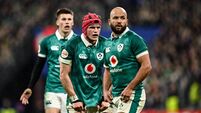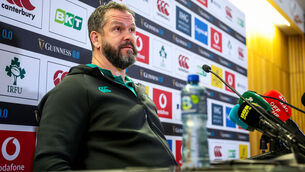Ultimate warrior
The 6 ft 5 inch, 17 stone, Young Munster man was such an all-round hit in Australia that he was a veritable shoo-in on everybody's "team of the tournament" and had scarcely unpacked his bags in Limerick than he was picking up the Texaco Irish rugby player of the year award.
Many fine prospects have drowned without sight under such an accolade. Not O'Connell. And not with the 'earthy' views of his Munster team-mates to deal with. He was back in the red jersey on Friday night helping Munster defeat Cardiff in the Celtic League, immediately rushing back to Limerick to present an autographed Munster jersey to one of his great admirers, Dr Denis O'Keeffe, who was celebrating his 80th birthday party in Limerick Lawn Tennis Club. On Saturday, he drove back to Cork with his dad, Mick, who played his rugby with Sunday's Well and Young Munster, who were paired in an AIB League Division Two game at Musgrave Park. Naturally, O'Connell turned heads and while the plaudits are much appreciated, he knows as he looks back on the World Cup that Ireland should have done a whole lot better.















